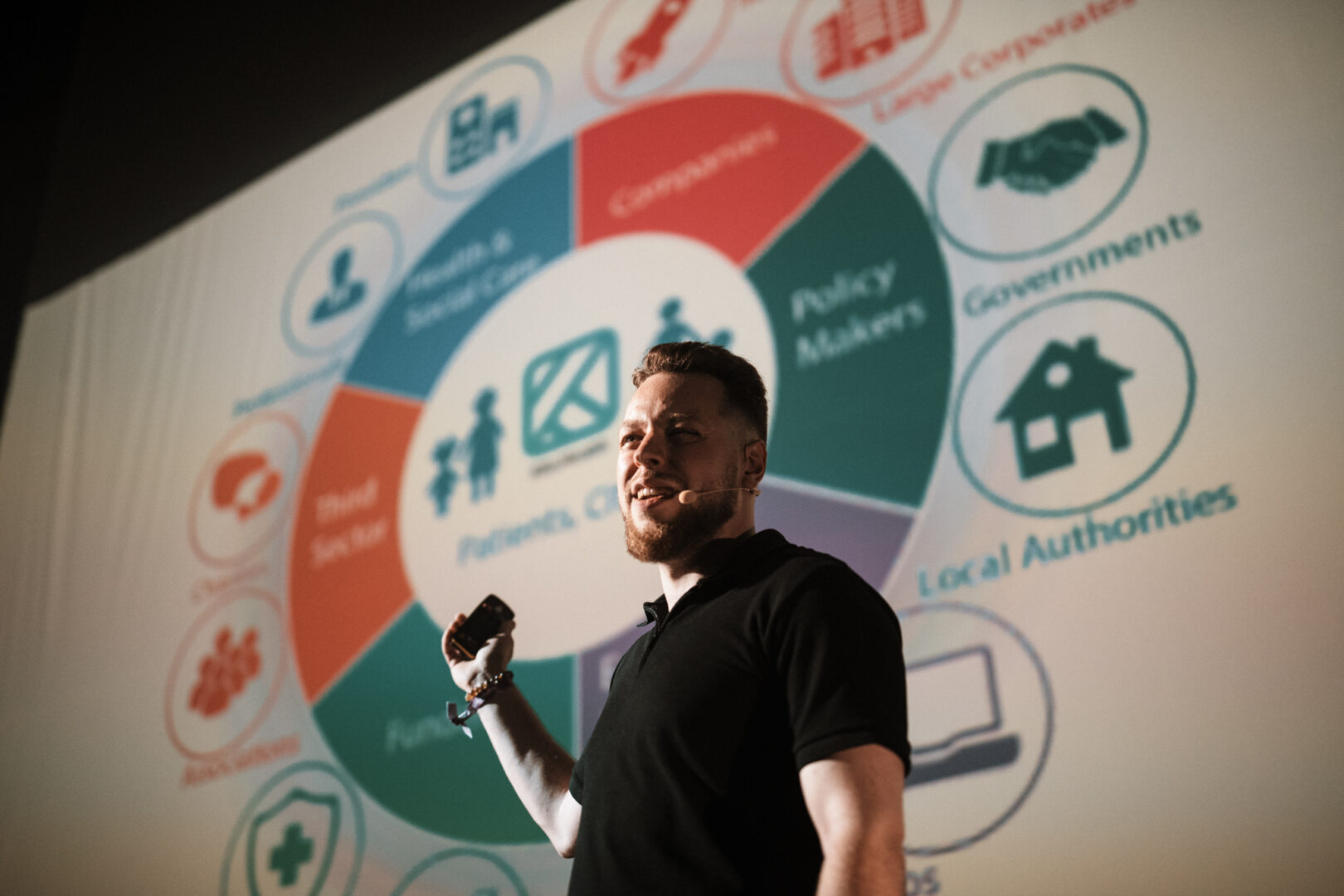

What are the digital health trends today? 82% of Americans have tried health advice they found online. Around half don’t use the digital health tools that are available to them. Most believe they know how to take care of their health. But the statistics from the Centers for Disease Control and Prevention (CDC) show otherwise.
These are just some of the findings of the new survey by Kilo Health that defines the ways digital transformation is changing consumer attitudes and the tools used for improving health.
What is happening here? More importantly, what could medical care providers, policymakers, and businesses do to help save the health of people who do not have the resources or time to get well?
Have you ever got a strange sensation in your chest, googled it, and found out that it’s definitely, undoubtedly, 100% cancer? After all, you’ve read about it in a blog with a sciency-sounding title, or in the depths of a Reddit forum.
Or how about another scenario – you feel a weird ache in your lower back, go down the rabbit hole of research, and end up with a self-diagnosed kidney disease. Lucky for you, according to the articles you read, it be treated by either a visit to a doctor or drinking some cranberry juice.
You choose the juice.
With more information available online, health research has become one of the topics we cannot ignore anymore. CDC data shows that in 2009, 61% of people sought health information online. The number rose to 72% in 2014, as shown by the data from Pew Research Center.
The Kilo Health report defines that in 2022, up to 93% of American adults search for health advice online. 82% have tried health advice found on the internet. 65% would search for their symptoms online before contacting a primary healthcare provider.
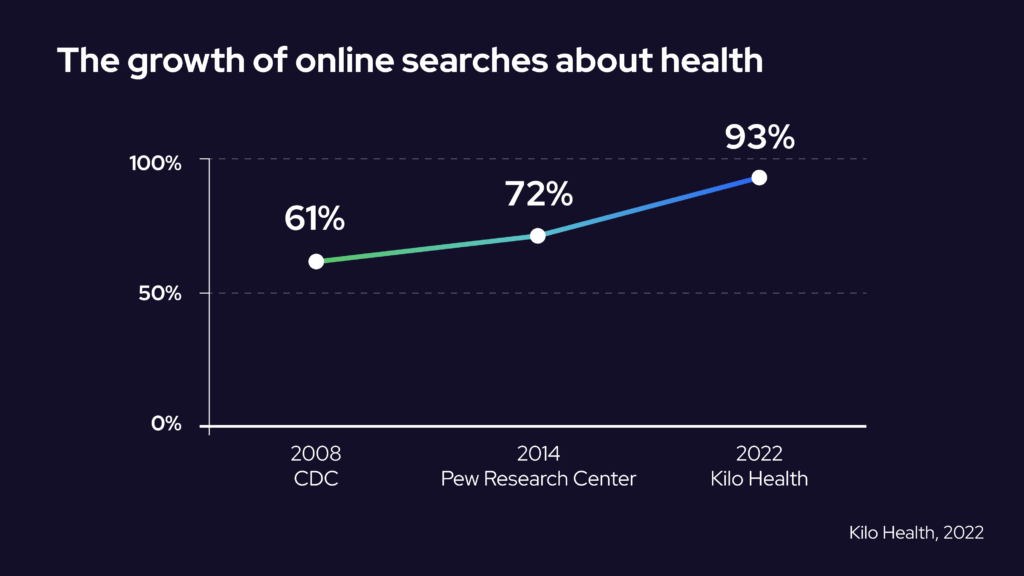
Don’t get me wrong. I love it when my patients are well informed and try to understand the scope of their symptoms, their interdependencies, and how they compound into diseases. However, I prefer when I can do my job and actually diagnose the issue instead of trying to fight off disinformation – or even worse, meet the patient too late after they spent weeks treating themselves.
The internet can definitely be a valuable resource. However, we must ensure that patients have the skills and knowledge necessary to pick the right sources, understand the information available in the research papers, and correctly estimate when they should go see their doctor.
Do you remember how wacky and odd the first mobile phones and digital cameras were? Yeah, me neither. 😉
However, every early adopter who got them was using this technology mostly out of curiosity. It was more like a novelty toy than a daily tool. Daily use requires wide adoption – you cannot fully enjoy a smartphone unless you have someone you can text.
A couple of years ago, we reached an important milestone with wearable devices and other digital health tools. According to Deloitte, 77% of consumers had never tried a virtual visit to their doctor in 2018. Today, 80% of people surveyed by Kilo Health have had at least one type of digital interaction (via phone, video, SMS, or app).
Digital health adoption spiked highly during the pandemic, especially in the telehealth industry. Using new technology to connect with your doctor became common – even grandpas got around to video calling their doctor these days and checking their test results online.
While I applaud this change, the same report shows that there is still one missing piece there – digital health apps and wearables. 51% of people surveyed say they haven’t ever tried wearable devices, and 43% have never used any digital health app. Around half of the people think digital health is the same as telehealth.
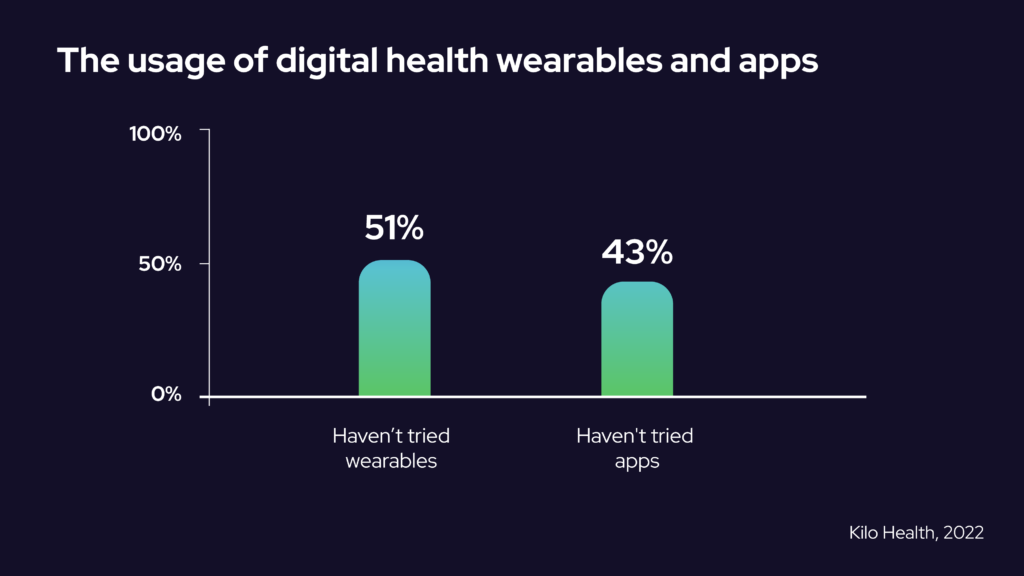
I see this as a missed opportunity. Digital health is way more than simply connecting with your doctor. It can be so much more. Today, we have all the tools we need to make the most out of it. From disease prevention with personalized wellness programs to daily blood glucose level tracking to fall alerts – this is just the beginning of the new era. We are already living in the future and have all the tools. But do not use them.
From what we see, it’s an issue of lack of interest, high cost, and declining trust. For instance, in 2005, 15.4% of Americans surveyed said they don’t use mobile health apps. The reason? People don’t trust apps with their data. Our survey today shows that the number today is 28%.
According to an Accenture study, only 45% of people trust tech companies to keep their information secure.
I see this as a responsibility for the businesses, and a partnership opportunity for all the stakeholders, including research institutions. And, of course, tech companies must implement the highest security standards to protect their customer’s data. This helps to regain the trust to ensure that health technology becomes a tool instead of a toy.
Don’t you just love it when you are feeling terrible, and someone advises you to eat better, drink more water, or sleep it off? Naturally, you’d just smile politely but internally want to scream to their face, “YES, I KNOW THAT ALREADY.”
The problem is we all know how to be healthy, and might even do something nice to our bodies from time to time. We eat a pear, take the stairs, and maybe even subscribe to a 12-month gym membership in January just to stop going altogether in March. Sometimes, we publicly announce that we will cut out fast food on Monday just to find ourselves crunching over a bag of chips when the bell hits 12.
We know and try. But we fail.
Somehow we are quite delusional and think that knowing how to stay healthy equals actually doing it. The mismatch between perceived and actual health is very dangerous because it doesn’t encourage actually taking action.
In the Kilo Health survey that is representative of the US population, 87% of respondents said they know how to take care of their physical health, and 70% have a solid routine for taking care of physical health. Around 70% of people surveyed think their physical health is either good or they just have some minor issues.
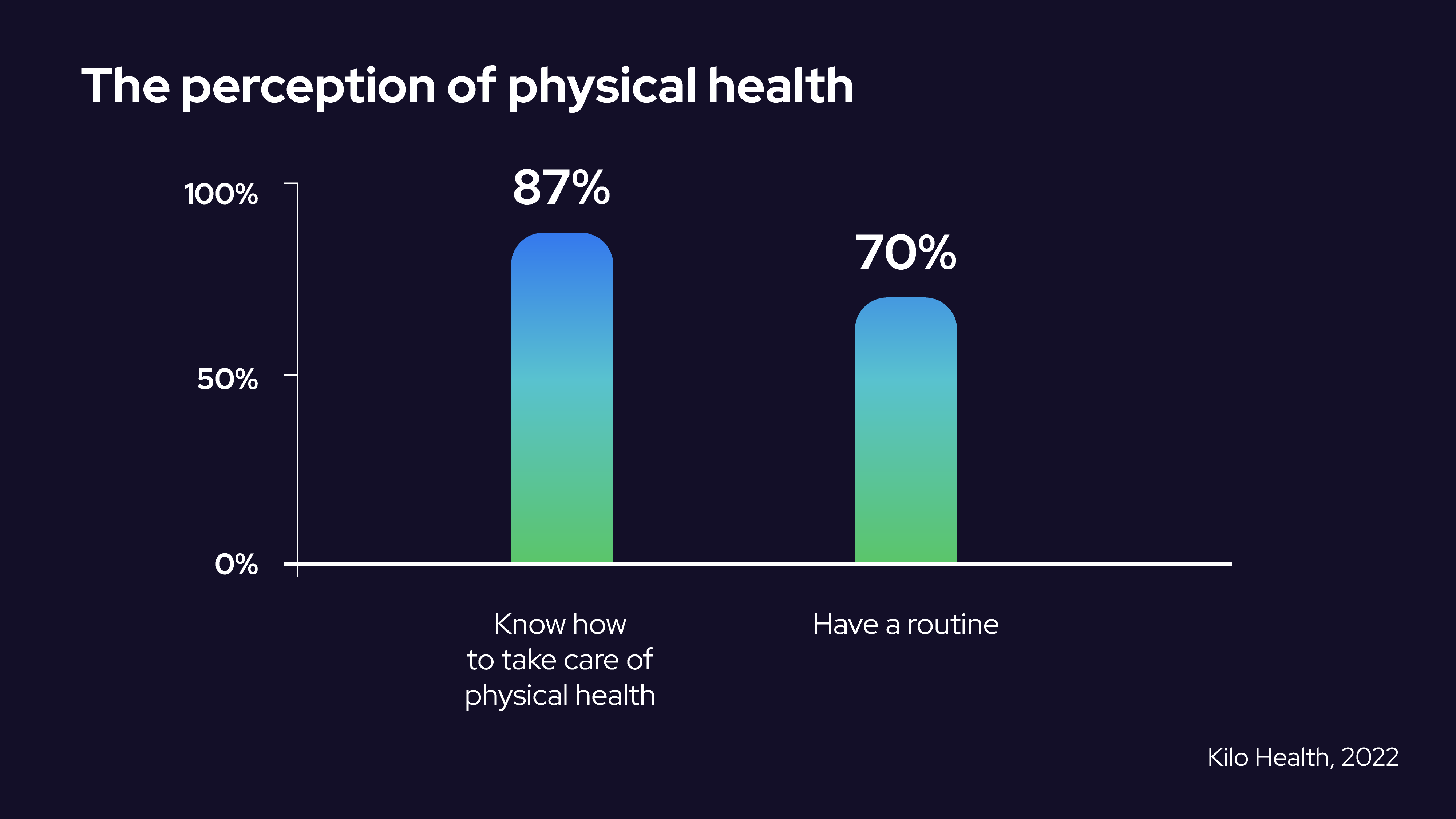
However, the CDC paints a vastly different and grim picture. 6 in 10 people in the US have a chronic disease, and 4 in 10 have more than one. Obesity levels are growing, and only 2.7% of American adults can say they live a healthy lifestyle (as defined by 4 characteristics: exercise, healthy food, non-smoking, and healthy weight).
I sincerely believe that the old method of encouraging people to get healthy doesn’t work because humans need novelty. We already know how to take care of our health.
To actually start taking care of our health, we need new ways that would keep us interested. It might be a gamified app that uses behavioral science to build better habits. A tool that utilizes augmented reality to help choose the healthiest foods at the store. A training program in virtual reality where instead of your usual cardio routine, you break a sweat with a sword in your hand while fighting monsters.
Technology is neutral. It can be bad for our health when we scroll through social media for hours before sleep. Or it can help us adapt to the quickly changing world and unlock new ways to care for ourselves.
Knowing how to take care of your health is not the same as doing it. Technology can help us build better habits and take small steps toward better health.
The key here is to get rid of misconceptions and start taking action – and technology companies must keep that in mind while creating their products.
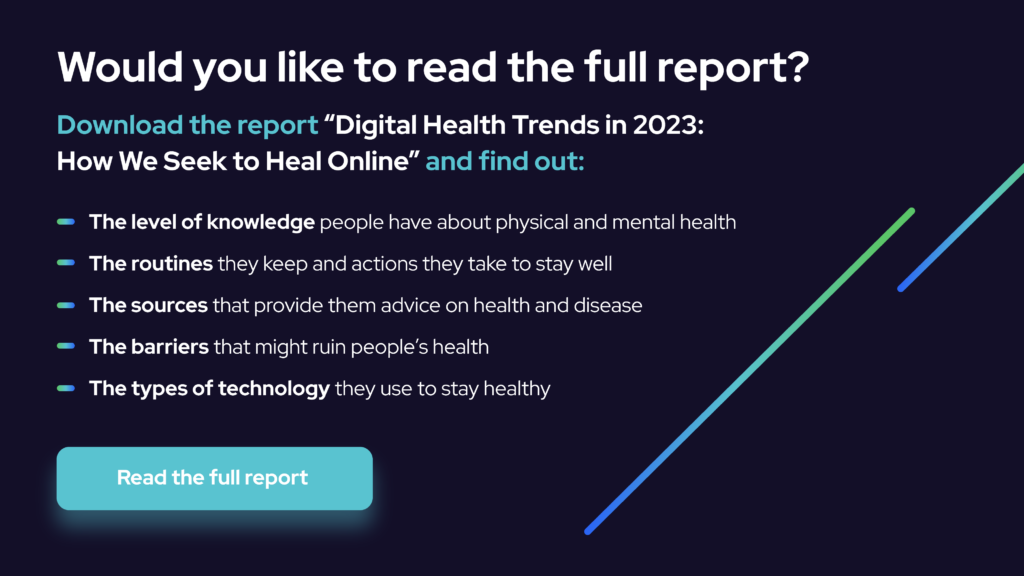
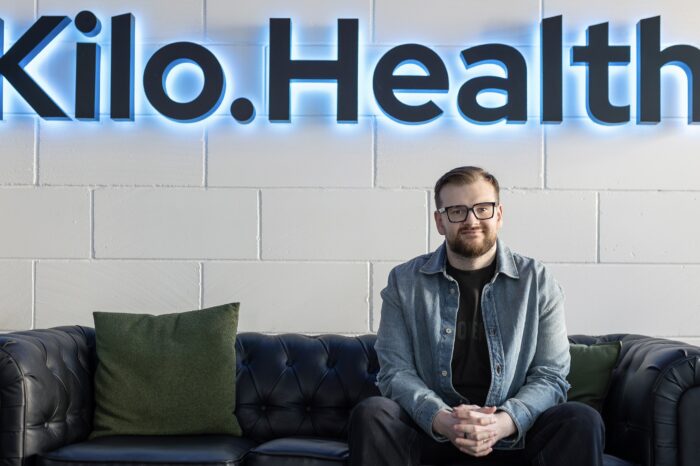
Kilo Health concluded 2024 on a strong note, achieving stable revenues and growth, alongside a team of 450 employees. In 2024, the company’s consolidated revenue remained steady at €234 million, the same as in 2023. Despite external market challenges, Kilo…
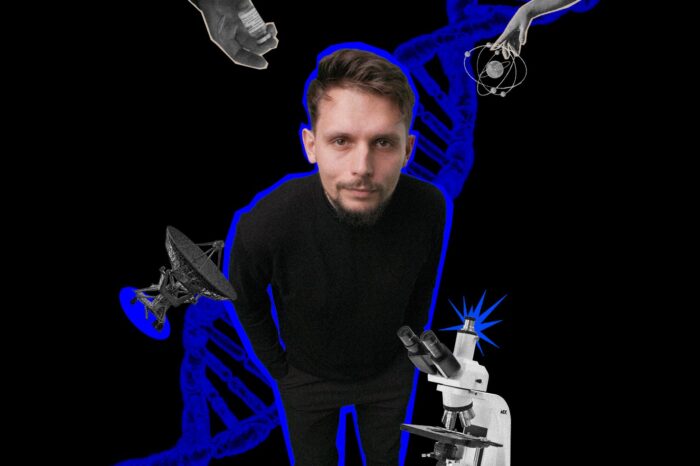
Ask, research, support. These three words sum up my role — or maybe just the nerd face emoji. Currently, I am working as a Scientific Research Lead at Kilo Health. But before that, I’ve always been on a similar path,…

As we’re entering an exciting new chapter of business growth and leadership, it’s the perfect time to catch up on the latest changes in our team and where we’re headed next. Dive in and get to know our new CEO…

I’m Matas, and when asked, I refer to myself as an intern — always learning. However, research, strategy, business development, and idea generation are the cornerstones of my work. I want to pull back the curtain and give you an…
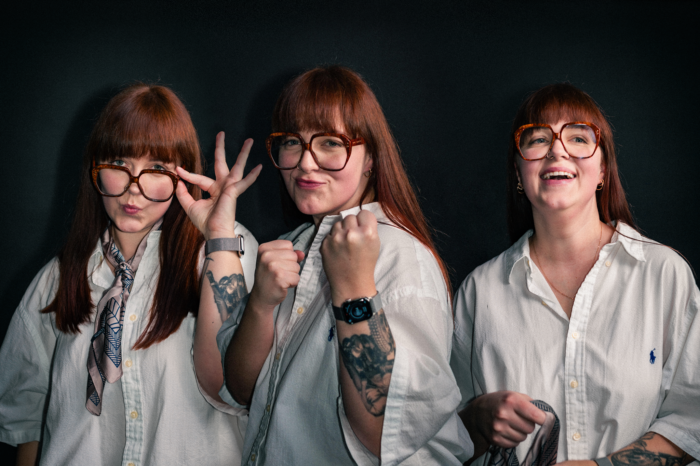
I’m Deimante, currently Head of Marketing at Kilo Health, and a big lover of this company. My journey to being hired at Kilo has been quite the ride. How it all started? I underwent interviews with 11 different people and…

Ever dreamt of taking the lead, even if the path isn’t crystal clear? Or to have someone believe in you and offer you a chance to figure out whether you would thrive in a startup environment? Speaking of which, Kilo…
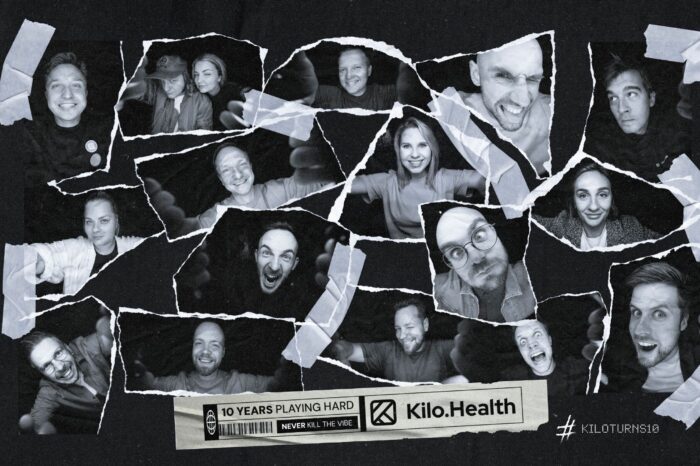
A whole decade has raced by in the blink of an eye for us at Kilo Health, and what better way to celebrate than to reflect on the milestones and lessons over the years? Do you know where we started?…
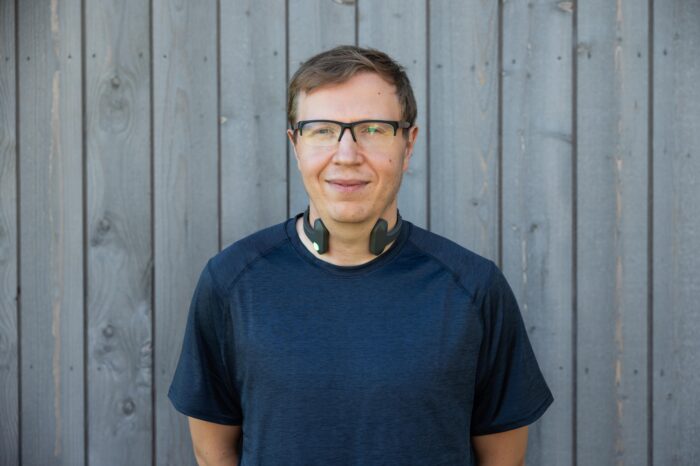
We, the co-founders, are just ordinary individuals with grand ambitions. There are times when we work twice as long and intensely as others, yet we’re equipped with the same amount of daytime, energy, and capacity. However, as leaders in the…

There’s no enchanting tale behind how I became a part of Kilo Health. In truth, some of us regular folks simply have regular journeys, and that’s perfectly fine. What counts is that today, I hold a successful product in my…

Reflecting on your achievements from the previous year is advantageous. That’s exactly what we did, proudly demonstrating our boundless aspirations through an impressive 84% growth and 213 million euros. So let’s put our hands in the air and celebrate together,…

I joined Kilo Health back in 2019, and I can prove that when people’s values and mindsets align, great things can be accomplished, even if you don’t have a plan. BoomeranGO!, the first and only product for children provided by…
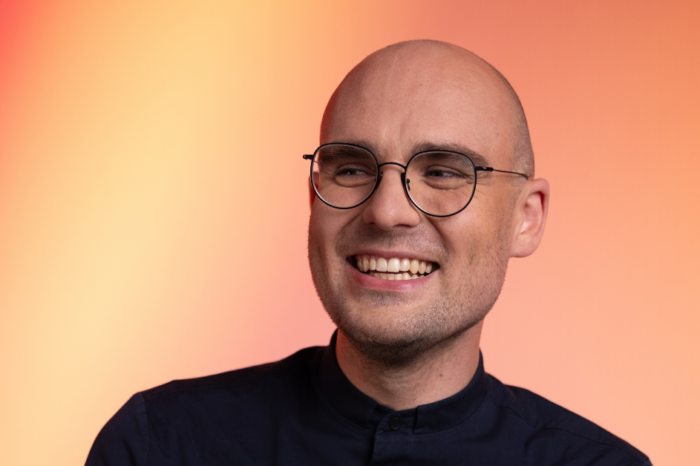
Lighting, sound, set, and actors are essential components of a film studio, but they are not the sole factors that define its success. Consistent creativity, appreciation of talent, and adaptability to market trends are a few of the things that…
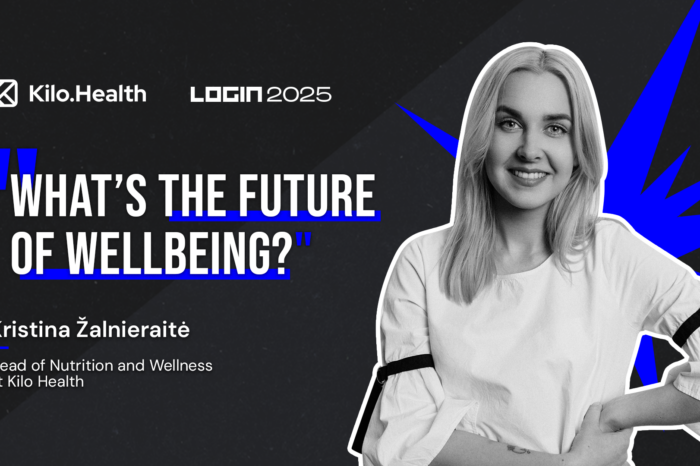
Imagine a world where technology creates a tailor-made meal plan and recommendations after analyzing different data about you. This is not science fiction but a reality that is fast approaching. Traditional plans drawn up by nutritionists are already being replaced…

Hey, I’m glad you’re here — I’m Viktorija Jokantaite-Kutke, the CEO of the Weight Management Accelerator at Kilo Health. One thing about me is that I don’t do boredom. I am always moving, always building. Try to keep up! When…